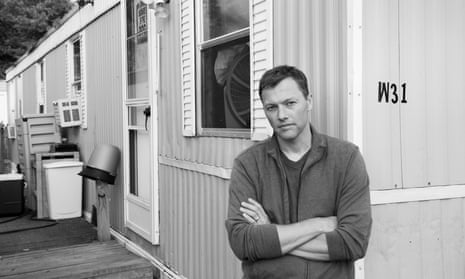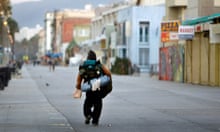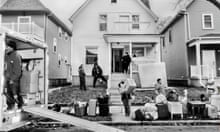Were you surprised by the response to the book? [Author and activist Barbara Ehrenreich said it set a “new standard for reporting on poverty”. It was a New York Times bestseller, awarded the Andrew Carnegie medal for excellence, and is shortlisted for next month’s National Book Critics Circle awards.]
I knew that we had an important topic, something that I don’t think people had recognised before, unless they were working in this area or had been on the receiving end of the problem. I didn’t know that so many people would resonate with it and connect with the people in the book.
The events in the book took place between May 2008 and December 2009, when you lived with and recorded the housing struggles of eight families.
When I want to understand a problem, I want to understand it from the ground level. I knew that I wanted to write a book about poverty in America and I wanted people’s narratives to drive the book. I also knew I wanted to get landlords in there and judges and movers. I didn’t know where I was going to start, so I moved to Milwaukee and I was living in a flop apartment and wondering: “How do you find evicted people? Where do you go?” Then I read this story about a trailer park that might be facing a mass eviction, so I drove down there one night and moved in. I lived in a trailer for about four months and then moved to an inner-city rooming house for about 10 months.
What led up to Evicted?
I’m from a small town and I thought I would be a lawyer. When I got to college I was just confronted with this story of America that just wasn’t the story that I grew up with: that if you work hard, play by the rules, you get ahead and that mobility was open to a lot of folks. I was like that college student sitting in the class getting his mind blown. I started spending a lot of time in the library trying to resolve this dissonance between what I felt my country was like and what it might be like. I had that ethnographic impulse from a young age – I started hanging around with a lot of homeless people around my university, volunteering at Habitat For Humanity [a US housing charity], things like that. That kind of pushed my interest more to understand poverty. This country has so much wealth and so much poverty and that seemed wrong to me. Evicted was my PhD dissertation.
How have the subjects responded to reading about themselves?
One thing that so moved me was their – how to put this? – integrity for the story, their respect for the story. I remember when I’d finished reading it to Crystal [one of the evictees] – she had been in a tough spot – and I looked up and she says: “You know I knew there would be some personal stuff in there but that’s how it was.” It’s kind of amazing to me. I mean you agree to be in a book like this and it’s hard to know what you’re agreeing to, right? I always knew I wanted their blessing, their final sign-off. We have used the proceeds from this book to start a foundation for people in the book, so recently we were able to help Larraine [see extract] move into a better apartment with better furniture and stuff.
Why Milwaukee?
I love Milwaukee, the rust belt. It’s a very special part of America that’s full of promise but also full of pain, where poverty is acute. I think if you care about poverty, cities like Milwaukee, Buffalo, Detroit, Gary [in] Indiana, have a big story to tell. We’ve already got a lot of stories on New York and Chicago, San Francisco.
Which books have inspired you?
I see myself writing in the tradition of urban ethnography and in the tradition of the sociology of poverty. So books that have had a deep impact on me include Tally’s Corner by Elliot Liebow – wonderful ethnography of Washington DC in the 1960s – or All Our Kin: Strategies for Survival in a Black Community by Carol Stack. More recently there was a book called Sidewalk by Mitchell Duneier about New York City. Also works of narrative nonfiction have taught me a lot – Joseph Mitchell writing in the New Yorker, Joan Didion.
What are you doing now?
I teach at Harvard and focusing on understanding this problem on a national level is a big priority of mine right now – where evictions are going up and down, what cities are actually instituting policies that work, what housing insecurity is doing to our cities, neighbourhoods, our kids. Just Shelter is a small platform [a website] we started because people read the book and wanted to respond. We wanted to have something at the ready to connect to people fighting eviction in their community. So a reader in Anchorage, Alaska or Omaha, Nebraska could find out who is working in their backyard. It is also a space for people to tell their own eviction stories.
The book is not without hope.
In as much as it’s not complicated to solve the housing problem. The good news is we have programmes that work; the good news is that when families do benefit from housing assistance their lives get markedly better – they live in way better neighbourhoods, their kids get stronger and healthier, they are more stable. The problem is we’re dosing it too small. It’s not in the design, it’s in the dosage. We can spend smarter or we can spend stupid and this is an issue that touches other areas. Without stable shelter everything else does fall apart. The problem is that assistance is a lottery that a lucky minority of poor families benefit from. We don’t need to outsmart this problem, we need to out-will it. We need to hate it more. I want to understand how the new administration is going to treat the most vulnerable in America. Like many of us I’m still trying to understand what’s coming down the pike.











Comments (…)
Sign in or create your Guardian account to join the discussion